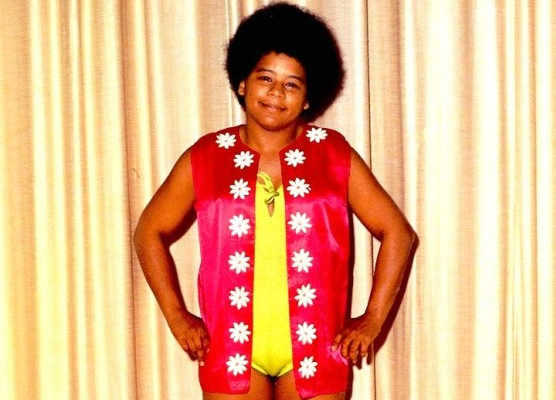Twenty-five years before Jacqueline defeated Sable to win the newly-revived WWF Women’s Championship, Sandy Parker became the first black woman to win a major World Championship. While other black pioneers in women’s wrestling were forgotten or excluded, this no-nonsense Canadian wrestler wrote her own name, wrestling under her real name, in history books in Japan.
Born in Vancouver, British Columbia, Parker was a self-proclaimed tomboy. She enjoyed baseball, fighting boys in her neighborhood, and climbing trees. Eventually, she became an avid wrestling fan, after attending her first live event. In the 1960s, she became a regular at local shows, even making the trip to the U.S. to attend shows in Seattle.
During a Judy Grable match, Sandy decided to become a wrestler after a friend told her she “could do that”. She sent letters to various gymnasiums in search of a trainer, until Lou Klein finally responded. Living in Windsor, Ontario, at the time, she would make the trip across the border three times a week to train with him in Allen Park, Michigan.

Sandy Parker made her debut in the early 70s, at the age of 23. She learned how to take bumps and do basic holds from Klein and veteran trainers, Mary Jane Mull and Lucille Dupree. But in order to further her career, she was advised to join the Fabulous Moolah’s training school in South Carolina. Moolah, real name Lillian Ellison, stepped in to fill the void they left behind by Mildred Burke and Billy Wolfe, meaning women’s wrestling in the States essentially ran through her.
So, Parker moved out to Moolah’s “camp”, where she initially enjoyed the accommodations. However, her blunt, uncompromising personality put her at odds with Moolah after about seven months. “If you didn’t do things her way, then you didn’t do it all,” Parker said. “It was as simple as that.”
Sandy described her new trainer as attentive and encouraging, but she ultimately felt like she was being taken advantage of by Ellison. Moolah would receive the women’s checks, then take her cut before she passed the remainder on to the talent. Parker also noted she was prone to play favoritism, while taking opportunities away from those she clashed with.
“Everybody knew that if you weren’t on Lillian’s good side, you got crappy bookings,” comments Parker. “I wasn’t on her good side because I wouldn’t do what she wanted me to do. That was one of the reasons I never worked Madison Square Garden, because every time the bookings came up, I’d be on her bad side. As far as I am concerned, I could wrestle just as good as Toni Rose, Donna Christenello or anyone of those girls (who were on Ellison’s good side).”
To further aggravate their working relationship, Moolah would interfere in Parker’s personal life. The allegations that Ellison would have the women exchange sexual favors to secure bookings are well-documented. Nevertheless, Parker is a lesbian, which she says Moolah knew, but she would still try to coerce her to go out with men. Her strict rules also forbade Parker from going to gay bars on her off time.

Eventually, Sandy couldn’t take it anymore and left the training school to work with Mildred Burke in Japan. Despite her feeling about Moolah, she did enjoy working with women like Betty Nicoli and Toni Rose. She won her first championship with Sue Green, when the two defeated Donna Christianello and Rose to become the NWA World Women’s Tag Team Champions, in 1971.
Parker notably enjoyed playing the heel, but as a black woman, she was often forced to be a babyface, because promoters were afraid the crowds would get too hostile if she wrestled as a heel. Certainly, a sign of the time, but she got to do more heel work in Japan, where she found her greatest success.
Following her bitter rivalry with Billy Wolfe, Mildred was no longer recognized as the NWA World Women’s Champion. So, she created the WWWA World Championship, which she defended as the first champion. All Japan Women’s Pro-Wrestling (AJW) Association formed in 1955 as a response to all the women’s wrestling promotions that started after Burke and the World Women’s Wrestling Association (WWWA) toured Japan in 1954.
Sandy joined AJW, where she and Masked Lee became two-time WWWA World Tag Team Champions in the summer of 1973. On May 15, 1973, she defeated Miyoko Hoshino, ending her 293-day reign to become the tenth WWWA World Champion. The win made Sandy Parker the first black woman to win the title, and the first to win a major world championship.
All-and-all, Parker went on to win the WWWA Tag Titles six more times, adding up to eight total, before retiring in 1986. She was the only black woman to hold the Single Championship for nearly twenty years, until Aja Kong won the title for the first time in 1992, followed by Awesome Kong (known as Amazing Kong at the time) in 2004. Sandy, who is now 66 years old, was ahead of her time, breaking down barriers for women of color for years to come.
She’s a living legend, so she should get all the flowers while she can still smell them. Do you think Sandy Parker deserves more recognition for her contributions to pro-wrestling?
Sandy Parker’s quotes in this article were pulled from “Sandy Parker: Addicted to Wrestling” from Slam Sports.
